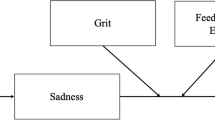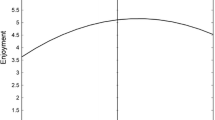Abstract
After receiving deliberately inaccurate negative feedback from a female confederate on role-play performance, with resultant decrease in efficacy expectations, subjects were assigned to one of four groups: (a) additional role-play with no feedback, (b) additional role-play and experimenter discrediting of the initial negative feedback, (c) additional role-play with positive feedback from confederate, and (d) experimenter discrediting. The no-feedback group showed significantly less recovery than the other conditions on two of the three efficacy measures, whereas the role-play with positive feedback and the experimenter discrediting groups demonstrated comparable recovery on all efficacy measures. No significant differences were found on the third measures of efficacy expectations. Also, the role-play with positive feedback group anticipated greater role-play “ease” than the role-play with no feedback and the role-play with discrediting conditions. Positive correlations were found between clarity of subjects' attributions for initial negative feedback and the “strength” of their efficacy ratings for future performance. Efficacy expectations also correlated positively with external ratings of self-expressiveness, but not with friendliness and self-assuredness. Results are discussed in light of recent studies on schematic biases and their disabuse.
Similar content being viewed by others
References
Bandura, A. (1977). Self-efficacy: Toward a unifying theory of behavioral change.Psychological Review, 84 191–215.
Bandura, A. (1982). Self-efficacy: Mechanism in human agency.American Psychologist, 37 122–147.
Barrios, B. A. (1983). The role of cognitive mediators in heterosocial anxiety: A test of self-efficacy theory.Cognitive Therapy and Research, 7 543–554.
Beach, S., Abramson, L., & Levine, F. (1981). The attributional reformulation of learned helplessness and depression: Therapeutic implications. In H. Glazer & J. Clarkin (Eds.),Depression: Behavioral and directive intervention strategies. New York: Garland.
Brady, J. P., Davison, G. C., Dewald, P. A., Egan, G., Fadiman, J., Frank, J. D., Gill, M. M., Hoffman, I., Kempler, W., Lazarus, A. A., Raimy, V., Rotter, J. B., & Strupp, H. H. (1980). Some views on effective principles of psychotherapy.Cognitive Therapy and Research 4 269–306.
Derry, P. A., & Kuiper, N. A. (1981). Schematic processing and self-referents in clinical depressions.Journal of Abnormal Psychology, 90 286–297.
Fazio, R. H., Effrein, E. A., & Falender, J. J. (1981). Self-perceptions following social interaction.Journal of Personality and Social Psychology, 41 232–242.
Frank, J. D. (1976). Restoration of morale and behavior change. In A. Burton (Ed.),What makes behavior change possible? New York: Brunner/Mazel.
Glass, C. R., Merluzzi, T. V., Biever, J. L., & Larsen, K. H. (1982). Cognitive assessment of social anxiety. Development and validation of a self-statement questionnaire.Cognitive Therapy and Research, 6 37–55.
Goldfried, M. R. (1980). Toward the delineation of therapeutic change principles.American Psychologists, 35 991–999.
Ingram, R. E., Smith, T. W., & Brehm, S. S. (1983). Depression and information processing: Self-schemata and the encoding of self-referent information.Journal of Personality and Social Psychology, 45 412–420.
Jennings, D. L., Lepper, M. R., & Ross, L. (1981). Persistence of impressions of personal persuasiveness: Perserverence of erroneous self-assessments outside the debriefing paradigm.Personality and Social Psychology Bulletin, 7 257–263.
Keppel, G. (1982).Design and analysis: A researcher's handbook (2nd ed.). Englewood Cliffs, New Jersey: Prentice-Hall.
Markus, H. (1977). Self-schemata and processing information about the self.Journal of Personality and Social Psychology, 35 63–78.
McFall, R. M. (1982). A review and reformulation of the concept of social skills.Behavioral Assessment, 4 1–33.
Rehm, L. P., Marston, A. R. (1968). Reduction of social anxiety through modification of self-reinforcement: An instigation therapy technique.Journal of Consulting and Clinical Psychology, 32 565–574.
Rogers, T. B. (1977). Self-reference in memory: Recognition of personality items.Journal of Research in Personality, 11 295–305.
Rogers, T. B., Kuiper, N. A., & Kirker, W. S. (1977). Self-reference and the encoding of personal information.Journal of Personality and Social Psychology, 35 677–688.
Ross, L., Lepper, M., & Hubbard, M. (1975). Perseverance in self-perception and social perception: Biased attributional processes in the debriefing paradigm.Journal of Personality and Social Psychology, 32 880–892.
Seligman, M. E. P., Abramson, L. Y., Semmel, A., & von Baeyer, C. (1979). Depressive attributional style.Journal of Abnormal Psychology, 88 242–247.
Sutton-Simon, K., & Goldfried, M. R. (1977). Faulty thinking patterns in two types of anxiety.Cognitive Therapy and Research, 3 193–203.
Swann, W. B., & Hill, C. A. (1982). When our identities are mistaken: Re-affirming self-conceptions through social interaction.Journal of Personality and Social Psychology, 43 59–66.
Twentyman, C. T., & McFall, R. M. (1975). Behavioral training of social skills in shy males.Journal of Consulting and Clinical Psychology, 43 384–395.
Wachtel, P. L. (1977).Psychoanalysis and behavior therapy: Toward an integration. New York: Basic Books.
Walster, E., Berscheid, E., Abrams, D., & Aronson, J. (1967). Effectiveness of debriefing following deception experiments.Journal of Personality and Social Psychology, 6 371–380.
Author information
Authors and Affiliations
Additional information
This research was supported in part by Grants MH 24327 and 40196 from the National Institute of Mental Health, awarded to the second author. The authors would like to thank Michael Palij for his suggestions on the statistical analyses, and Duane Kemp, Philip C. Kendall, and Joseph Stets for their comments on an earlier version of this paper. In addition, we'd like to acknowledge the excellent work done by our four undergraduate confederates, Charleen Butchko, Debbie Dolan, Mara Karpel, and Andrea Vogel.
Rights and permissions
About this article
Cite this article
Newman, C., Goldfried, M.R. Disabusing negative self-efficacy expectations via experience, feedback, and discrediting. Cogn Ther Res 11, 401–417 (1987). https://doi.org/10.1007/BF01175352
Issue Date:
DOI: https://doi.org/10.1007/BF01175352




